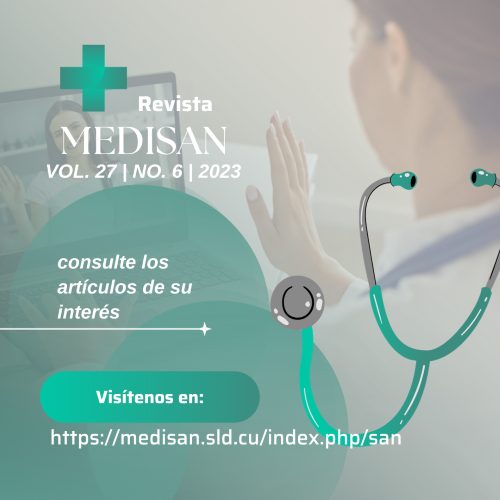Investigative training of university professors for the synchronous learning during covid-19
Keywords:
learning, distance education, teaching, higher education.Abstract
Introduction: Ongoing trainings during the covid-19 pandemic enabled learning in higher education.
Objective: To describe the investigative training and pedagogical function in university professors from the psychological complexity of synchronous learning during covid-19.
Methods: A study was carried out from July, 2020 to February, 2022, at San Luis Gonzaga National University in Ica, Peru. The investigative training consisted of two modalities: training workshops and postgraduates courses. Participation was recorded in the academic areas of health sciences, engineering and arts and humanities. A dendrogram was used to describe the pedagogical function between two groups of university professors (those who had permanent attendance and those who did not).
Results: In the training workshops, 52.0% of the participants corresponded to the academic area of health sciences, 35.0% to arts and humanities and 13.0% to engineering; while active participation was 22.2% in engineering, 8.9% in health sciences and 4.1% in arts and humanities. On the other hand, the percentage for graduate courses was 41.0 in health sciences, 30.0 in arts and humanities, and 29.0 in engineering, with active participation of 6, 4 and 3 professors, respectively. There were no significant differences in the internal evaluation between the postgraduate courses (p<0.00915). The dendrogram indicated greater similarity in university professors with permanent attendance.
Conclusions: There was lower attendance in postgraduates courses as the learning process was more rigorous and demanding; however, active participation was higher. There was greater similarity in the pedagogical function when attendance was permanent.Downloads
References
2. Sandhu P, de Wolf M. The impact of COVID-19 on the undergraduate medical curriculum. Medical Education Online. 2020 [citado 10/06/2023];25(1):1-2. Disponible en: https://www.tandfonline.com/doi/epdf/10.1080/10872981.2020.1764740?needAccess=true
3. Rojanaworarit C, El Bouzaidi S. Building a resilient public health system for international migrant workers: A case study and policy brief for COVID-19 and beyond. Journal of Health Research. 2022 [citado 08/05/2023];36(5):898-907. Disponible en: https://www.emerald.com/insight/content/doi/10.1108/JHR-01-2021-0035/full/pdf?title=building-a-resilient-public-health-system-for-international-migrant-workers-a-case-study-and-policy-brief-for-covid-19-and-beyond
4. Ali W. Online and Remote Learning in Higher Education Institutes: A Necessity in light of COVID-19 Pandemic. Higher Education Studies. 2020 [citado 22/05/2023];10(3):16-25. Disponible en: https://ccsenet.org/journal/index.php/hes/article/download/0/0/42784/44703
5. König J, Jäger Biela DJ, Glutsch N. Adapting to online teaching during COVID-19 school closure: teacher education and teacher competence effects among early career teachers in Germany. European Journal of Teacher Education. 2020 [citado 26/04/2023];43(4),608-22. Disponible en: https://www.tandfonline.com/doi/epdf/10.1080/02619768.2020.1809650?needAccess=true
6. Fuchs K. The Difference Between Emergency Remote Teaching and e-Learning. Front. Educ. 2022 [citado 29/04/2023];7:1-3. Disponible en: https://www.frontiersin.org/articles/10.3389/feduc.2022.921332/pdf?isPublishedV2=False
7. Al Lily AE, Ismail AF, Abunasser FM, Alhajhoj Alqahtani RH. Distance education as a response to pandemics: Coronavirus and Arab culture. Technology in Society. 2020 [citado 12/04/2023];63:1-11. Disponible en: https://www.sciencedirect.com/science/article/pii/S0160791X20303006/pdfft?md5=ae4655551e49df95aef728e504520418&pid=1-s2.0-S0160791X20303006-main.pdf
8. Bangert K, Bates J, Beck SBM, Bishop ZK, Di Benedetti M, Fullwood J, et al. Remote practicals in the time of coronavirus, a multidisciplinary approach. International Journal of Mechanical Engineering Education. 2020 [citado 18/04/2023];50(2):219-39. Disponible en: https://journals.sagepub.com/doi/pdf/10.1177/0306419020958100?download=true
9. Hansen G, Ringdal R. Formative assessment as a future step in maintaining the mastery-approach and performance-avoidance goal stability. Studies in Educational Evaluation. 2018 [citado 22/04/2023];56:59-70. Disponible en: https://doi.org/10.1016/j.stueduc.2017.11.005
10. Gibson P, Janikova J. Moral Injury, Psychological Ill-Health, and Severe Stress among COVID-19 Frontline Respiratory and Intensive Care Physicians and Nurses. Psychosociological Issues in Human Resource Management. 2021 [citado 22/04/2023];9(2):77-90. Disponible en: https://doi.org/10.22381/pihrm9220216
11. Nemteanu MS, Dabija DC. The Influence of Internal Marketing and Job Satisfaction on Task Performance and Counterproductive Work Behavior in an Emerging Market during the COVID-19 Pandemic. Int J Environ Res Public Health. 2021 [citado 26/03/2023];18(7). Disponible en: https://doi.org/10.3390/ijerph18073670
12. Brandt JO, Bürgener L, Barth M, Redman A. Becoming a competent teacher in education for sustainable development: Learning outcomes and processes in teacher education". International Journal of Sustainability in Higher Education. 2019 [citado 28/04/2023];20(4):653-30. Disponible en: https://doi.org/10.1108/IJSHE-10-2018-0183
13. Hetherington RW, Merk H, Waggoner J, Carroll J, Weitzel B. Partnering with School Leaders: Principal Assessments of completers. Journal of Education & Social Policy. 2019 [citado 14/03/2023];6(3):59-65. Disponible en: http://jespnet.com/journals/Vol_6_No_3_September_2019/9.pdf
14. Dunst CJ, Hamby DW, Howse RB, Wilkie H, Annas K. Research Synthesis of Meta-Analyses of Preservice Teacher Preparation Practices in Higher Education. Higher Education Studies. 2020 [citado 09/06/2023];10(1):29-47. Disponible en: https://ccsenet.org/journal/index.php/hes/article/download/0/0/41392/42849
15. Wallin A, Nokelainen P, Mikkonen S. How experienced professionals develop their expertise in work-based higher education: a literature review. Higher Education. 2019;77:359-78.
16. Cebrián G, Junyent M, Mulà I. Competencies in Education for Sustainable Development: Emerging Teaching and Research Developments. Sustainability. 2020 [citado 02/08/2023];12(2):579. Disponible en: https://doi.org/10.3390/su12020579
17. Waltner EM, Rieß W, Mischo C. Development and Validation of an Instrument for Measuring Student Sustainability Competencies. Sustainability. 2019 [citado 13/09/2023];11(6):1717. Disponible en: https://doi.org/10.3390/su11061717
18. Wamsler C. Mind the gap: the role of mindfulness in adapting to increasing risk and climate change. Sustain Sci. 2018 [citado 11/08/2023];13:1121-35. Disponible en: https://link.springer.com/content/pdf/10.1007/s11625-017-0524-3.pdf
19. Ormazábal I, Borotto FA, Astudillo HF. An agent-based model for teaching-learning processes. Physica A: Statistical Mechanics and its Applications. 2021 [citado 17/07/2023];565. Disponible en: https://doi.org/10.1016/j.physa.2020.125563
20. Humrickhouse E. Flipped classroom pedagogy in an online learning environment: A self-regulated introduction to information literacy threshold concepts. The Journal of Academic Librarianship. 2021 [citado 17/07/2023];47(2). Disponible en: https://doi.org/10.1016/j.acalib.2021.102327
Published
How to Cite
Issue
Section
License
All the articles can be downloaded or read for free. The journal does not charge any amount of money to the authors for the reception, edition or the publication of the articles, making the whole process completely free. Medisan has no embargo period and it is published under the license of Creative Commons, International Non Commercial Recognition 4.0, which authorizes the copy, reproduction and the total or partial distribution of the articles in any format or platform, with the conditions of citing the source of information and not to be used for profitable purposes.





